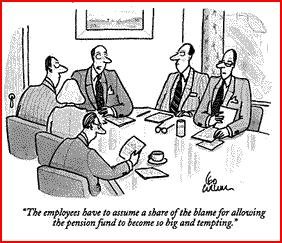They should compensate police officers (all employees actually) no higher or lower than what is needed to attract qualified people for the job.
DING! DING! DING!
I could hire you an entire police agency for just about any salary amount you wanted to pay. Probably fill a stadium with all the people who would take $1 a year. Not the people you really want to give badges, authority, and access to.
There is a consistent average of applicant rejection for major police agencies in the U.S.: 95-98%. The funny thing is that during poor economic times we get more applicants, but the rejection rate stays pretty consistent. Probably because, unlike most jobs, our qualification demands reach into areas of consideration that would be illegal hiring practices for most employers. Credit history, drug & alcohol use, criminal behavior (not limited to convictions, or even arrests), physical fitness, etc.
When the budget crunch is on there is a lot of pressure to lower standards. We had a mayor once who realized she could hire people as cops all day long even if she cut the salaries and reduced benefits. She was absolutely right about being able to hire people - she was just totally wrong about them being the kind of people you wanted doing that job. And there were years of ugly outcomes as a result. People who should never been hired were given badges, and, unlike the average job, the damage they do affects innocent people in some profound ways. Experienced employees who did the job right were lured away by other places. Many took pay cuts to go to federal agencies because the benefits were better, the retirement was better, and there was the potential for salary improvement in the future.
Exactly why are government/munincipal employees supposed to be protected by the rest of us no matter what? I suppose you're going to contend that everyone should get SS with no reduction in benefits forever too.
It's part of the same equation. Consider the military - what would the retention rate be for experienced NCOs and officers if the pension, salaries, hiring, training, etc., were cut because of a temporary budget shortfall? When the budget is fixed and you go back to hiring, where do you find a platoon leader who has actualy led troops in combat? A rotary wing pilot who has conducted hundreds of insertions and extractions in hot landing zones safely? A sonar chief who knows the difference between an enemy sub opening its missile doors and whales humping?
And if you find them, how much will it cost to lure them back?
And the people that stayed while their compensation and retirements were jacked with - how motivated and dedicated are they going to be?
People that join the military, become cops and firefighters, do it for a lot of reasons. Most of them have profound feelings of loyalty and a commitment to service. But they have families and dreams like everyone else and money is obviously an important element there. There comes a point in budget cutting when those people decide that they're just not going to do more with less today.
We went through about a decade of seeing our salaries and benefits erode and cut partly because there was a period of fiscal difficulty, and partly because the elected officials thought they could cut us and still achieve the same results.
"Why do we spend so much money on training cops? Can't they just get most of it in the form of experience?" Followed a few years later by, "Why have we lost so many lawsuits for failure to train or supervise?"
"Hey, if we have only three firefighters per truck, look how much money we will save." Followed a few years later by, "Why did three firefighters die in this building?"
Eventually we had difficulty in hiring qualified applicants, we lost tons of experience (it takes years to make a rookie into a capable field officer, and a decade to take a capable field officer and make him a good detective), and eventually commitment and dedication fell off the chart. Going from #3 in compensation in the
country to #5 in the
county caused a lot of people to take a hard look at why they were risking their lives and busting their butts for an employer who did not care.
You can cut salaries and you can cut pensions, but you have to realize there will be an impact on performance. And the impact is not something like it will take a few months extra to roll out our next product. It's more like, "Sorry sir, we have nobody available at the moment. Can you put out the fire / shoot the intruder / stop the bleeding by yourself?"



